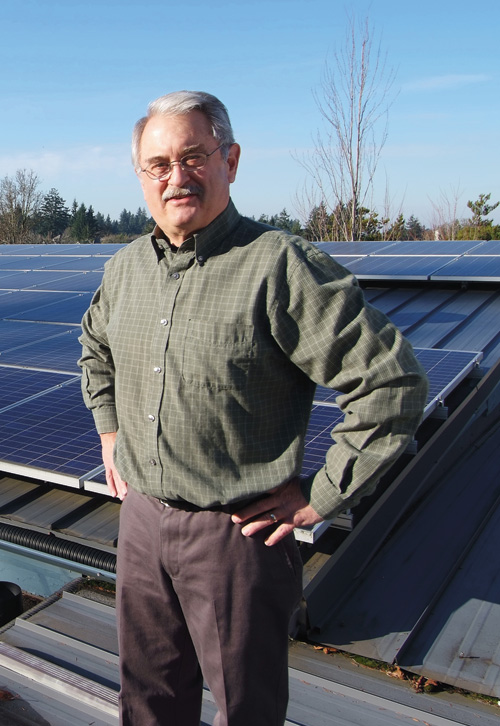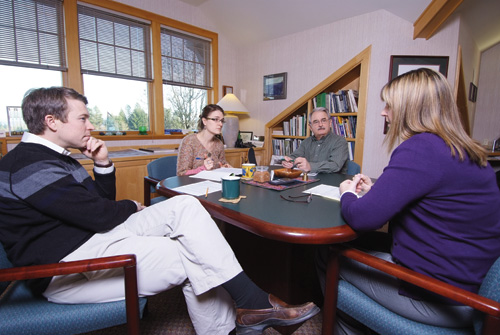 John Miller recalls a moment when things clicked into place for him. He was 10, traversing a forest road outside of Stayton with his father, a forester. “On one side, I saw trees he had planted 30 years ago, a healthy forest. On the other side of the road was a stump patch, still there years after the major timber company that owned it had cut the trees and run. That sort of set the tone for me.”
John Miller recalls a moment when things clicked into place for him. He was 10, traversing a forest road outside of Stayton with his father, a forester. “On one side, I saw trees he had planted 30 years ago, a healthy forest. On the other side of the road was a stump patch, still there years after the major timber company that owned it had cut the trees and run. That sort of set the tone for me.”
By Dan Cook
 |
John Miller presides over a diverse portfolio of business interests from his headquarters in Salem. While Miller has maintained a low public profile, he is well known among the state’s environmental and sustainability leaders.// Photo by Lynn Howlett |
John Miller recalls a moment when things clicked into place for him. He was 10, traversing a forest road outside of Stayton with his father, a forester. “On one side, I saw trees he had planted 30 years ago, a healthy forest. On the other side of the road was a stump patch, still there years after the major timber company that owned it had cut the trees and run. That sort of set the tone for me.”
Today, Miller presides over a family of companies under the Wildwood/Mahonia name. From offices in a renovated schoolhouse just off I-5 in south Salem, Miller and five employees, including vice president Travis Henry, manage a vineyard; a blueberry processing facility; a native plant nursery; residential, commercial and industrial developments; and an investment portfolio. All are driven by the triple bottom line philosophy — people, planet, profit — that he espouses.
“When we talk about the triple bottom line, we’re talking about the overall sustainability of a business. It means a business must be economically sustainable as well as socially and environmentally sustainable,” he says.
Indeed, Miller, president and owner of Wildwood/Mahonia, says the diverse nature of his holdings allowed Wildwood/Mahonia to continue to show a profit even during the worst days of the recent recession. “Over the past five years, Wildwood/Mahonia has increased its holdings by approximately 10%, remarkable in these challenging times,” he says.
Although environmental impact might be considered by most a poor driver of business decisions, Miller says in the long run those decisions lead to a profitable outcome.
“For instance, I tend to fit buildings to the landscape rather than clearing the land — which is easier of course,” Miller says. “But intuitively you know it will be a better project if you look at the environmental piece. You make more money doing it right and there’s some neat social aspects to it, too.”
Miller, 64, is acknowledged to be among Oregon’s foremost environmental advocates. Since launching his first sustainable project in the 1970s — a residential development in south Salem — the “social aspects” have become an ever greater focus of his work. In addition to his for-profit ventures, he is deeply involved in nonprofit work throughout the state.
He’s on the board of EcoTrust in Portland, works with the Clean River Institute in Tualatin, supports a children’s relief nursery in Salem founded by his wife, Sue, and plays an active role in SOLV, a statewide volunteer organization that focuses on environmental stewardship projects. He recently helped SOLV complete a $500,000 fundraising campaign to secure a matching grant from another noted Oregon philanthropist, John Gray. Children’s issues are another high priority for Miller; he and his wife have four children in their blended family.
To draw wider attention to the health of Oregon’s rivers, Miller helped found and fund the Honoring Our Rivers anthology, which publishes writing and artwork by Oregon students about the state’s waterways. Honoring Our Rivers is now a project of the Willamette Partnership and sponsors public readings from the books to cement the bond between literature, art and the environment.
Even his nonprofit work is driven by the triple bottom line, for he expects his nonprofit and for-profit partners alike to use their resources wisely and effectively.
“He likes to see these things make money,” says Tyson Keever, general manager of Sequential Pacific Biodiesel and co-founder and president of Sequential Biofuels. (Miller has a stake in the former.) “It’s very important to John that we be accountable.”
That sort of collaboration extends to government agencies as well. Working with the city of Salem last year, Miller was able to help secure a loan from the city to refurbish a warehouse for two emerging food processing companies, Wandering Aengus Ciderworks and Organic Fresh Fingers.
“The City of Salem’s innovative loan program helped two growing businesses create jobs, expand and stay in Salem,” Miller says. “The businesses have new equipment, are in larger, more energy- efficient spaces and partnered well with Wildwood because of their sustainable values and ties to Oregon agriculture.”
WILDWOOD/MAHONIA OPERATIONS Wildwood/Mahonia has developed approximately 10 acres of multi-family, 40 acres of single-family and 25 acres of industrial-commercial property throughout the Willamette Valley, including: Developed:
Undeveloped:
|
 |
Miller relies on a lean team to help manage his varied interests, including (from left) Travis Henry, Sarah Schra and Suzette LeBlanc.//Photo by Lynn Howlett |
Miller graduated from Stanford University in 1971 with a master’s degree in environmental design and came back to Oregon determined to build what would later be called “green” homes. He encountered roadblock after roadblock in his quest. Finding the right materials for his homes proved frustrating, and he encountered opposition from local building department officials who failed to understand his revolutionary construction methods.
In a response that would become his signature modus operandi, Miller explored new building products and methods that made his homes more energy efficient and less destructive to the environment. And he took the opposition of building officials as an opportunity to educate them on sustainable building practices. The homes he built in south Salem in the 1970s remain in high demand today and continue to outperform “green” homes built decades later in terms of energy efficiency and impact on the environment.
As Miller expanded his sustainable business interests into new areas, he began to be noticed by other Oregonians concerned about the degradation of the state’s forests and waterways. In 1996, first-term Gov. John Kitzhaber asked him to chair the Willamette Basin Task Force, which evolved into the Willamette Partnership. “The partnership put Oregon on the map in terms of environmental services,” Miller says.
Miller and Jack McGowan, another Oregon sustainability icon, served on the task force and became great friends and sustainability allies. McGowan remembers having long discussions about the environment with Miller, often over a bottle of wine made from Miller’s Mahonia Vineyard pinot noir grapes. McGowan, then executive director of SOLV, asked Miller to join SOLV’s board, which he has since left.
“He is truly a Renaissance man,” says McGowan, who retired from SOLV in 2008. “John’s an amalgam of passion, extremely high intelligence and remarkable creativity. He thinks so far ahead of the curve the rest of us are always trying to catch up.”
Miller’s innovative triple-bottom-line thinking has led to requests from officials in Washington, D.C., and as far away as China, for his input on creating sustainable business practices. Bill Gaffi, a colleague from the Willamette Partnership, says Chinese officials “treat John like a god.”
But his heart will always remain close to home, he says, where he can indulge his passion for encouraging young Oregon entrepreneurs.
When he heard about two young men in Eugene who were selling biodiesel fuel produced from used cooking oil, he contacted them. Miller was already a customer for the biodiesel, but he was curious about its potential. Keever remembers getting a call from Miller, who began to pepper the founders of Sequential Biodiesel with questions about the product.
Convinced they were on to something, he became both a customer of and an adviser to the company. He served as an adviser as the two men founded Sequential Pacific, a biodiesel production and research firm now located in a Wildwood industrial/commercial development in Salem. Keever and Miller say both companies are expanding their customer bases and biodiesel production is ahead of projections.
“He’s been very paternal to us,” Keever says. “I consider him a partner in the businesses. He’s been truly an ally in defining the biodiesel industry in Oregon. He really has more than just making money as a goal — it’s all about community to John. Oregon is a better place because of him.”
At his East Pringle Innovation Center just off I-5 in Salem, he signed on two food-processing tenants as his first “industrial incubator” clients. He’s drawn to the young entrepreneurs who run Organic Fresh Fingers and Wandering Aengus Ciderworks, his East Pringle tenants.
“I like to find young people with talent and energy and help them take the ball and run with it,” he says.
Partly that’s because, when Miller came back to Oregon fresh from Stanford with his environmental design degree, there weren’t many John Millers around to mentor him. But Miller also knows from his own experience that young people with a vision can deliver that triple bottom line that has served his business interests so well.

